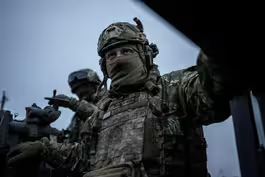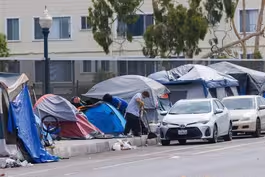
December 24, 2023 - PBS News Weekend full episode
12/24/2023 | 26m 36sVideo has Closed Captions
December 24, 2023 - PBS News Weekend full episode
December 24, 2023 - PBS News Weekend full episode
Problems playing video? | Closed Captioning Feedback
Problems playing video? | Closed Captioning Feedback
Major corporate funding for the PBS News Hour is provided by BDO, BNSF, Consumer Cellular, American Cruise Lines, and Raymond James. Funding for the PBS NewsHour Weekend is provided by...

December 24, 2023 - PBS News Weekend full episode
12/24/2023 | 26m 36sVideo has Closed Captions
December 24, 2023 - PBS News Weekend full episode
Problems playing video? | Closed Captioning Feedback
How to Watch PBS News Hour
PBS News Hour is available to stream on pbs.org and the free PBS App, available on iPhone, Apple TV, Android TV, Android smartphones, Amazon Fire TV, Amazon Fire Tablet, Roku, Samsung Smart TV, and Vizio.
Providing Support for PBS.org
Learn Moreabout PBS online sponsorshipexperiencing homelessness this holiday season.# Then as a congressional fight over Ukraine aid## is pushed into 2024, a new film documents the# human toll of the war and the resilience of## those fighting and living on the front lines.# And on this Christmas Eve, we dig into the## lucrative business of Christmas music and why# so many love listening to these holiday hits.
MAN: The oldness of this# music is part of its appeal,## because Christmas the holidays.
This is a# time when you crave familiarity and comfort.
(BREAK) JOHN YANG: Good ev were commodities in some parts of the world.# In Gaza, this weekend has seen some of the## most intense and bloodiest fighting of the war.# More than 200 Palestinians dead according to the## Hamas run Gaza health ministry, including# at least 70 in an Israeli airstrike today.
And the Israeli military says that since Friday,# 15 Israeli soldiers have been killed in combat,## all told since October 7.
Gaza officials say that# roughly 20,400 Palestinians have been killed,## and 154 Israeli soldiers have died.
That's an## addition to the 1200 Israelis killed in# the initial Hamas attack on Octobe Israel is unused to big numbers of# military casualties.
So these numbers## hit hard.
Israeli Prime Minister Benjamin# Netanyahu said in the Cabinet meeting,## that it's the sacrifice needed to free# the 129 hostages still held by Hamas.
BENJAMIN NETANYAHU, Israeli Prime Minister# (through translator): The war exacts a## very heavy price from us continue with all the force until the end# until victory until we reach all our goals.
JOHN YANG: In Bethlehem revered by Christians# as the traditional birthplace of Jesus,## there are empty streets instead of the festive# decorations and crowds of international tourists## of past Christmas Eves.
In one churches display# the baby Jesus is wrapped in a cafeteria and lies## on a pile of rubble.
Munther Isaac# is a Lutheran pastor in Bethlehem.
REV.
MUNTHER ISAAC, Pastor, Evangelical# Lutheran Christmas Church: This is what## with the bombardment of children.# While the world is celebrating,## our children are under the world rubble.
While# the world is celebrating our families are## displaced and their homes are destroyed.# So this is Christmas to us in Palestine.
JOHN YANG: In Europe, Security is tight after# an alert about a possible terror attack.
At## the Cologne Cathedral in Germany,# worshippers faced security checks.
In the United States dreams of a white# Christmas will go unanswered outside of## the Mountain West.
For much of the rest# of the country Christmas Day is expected## to be unseasonally warm and wet.
That's# in sharp contrast to last year when a## cold snap brought snow, ice and frost# in many parts of the United States.
This year it's been mild in the# upper Midwest and northern plains.## In Minneapolis today it was in the# 50s well above the previous reco high for the day of 46.
This caps what's# expected to be the warmest year on record.
Still to come on PBS News Weekend, a new# documentary captures the resilience of## soldiers and civilians on Ukraine's frontlines,# and the lucrative business of Christmas music.
(BREAK) JOHN YANG: A new government report estimates# a record number of Ameri homelessness.
Starting in 2007, the Department# of Housing and Urban Development sent volunteers## out on a single night each January to# count all the people they could find who## didn't have shelter.
Experts caution that# this is not a census and it's likely an## undercount because it's hard to find everyone# experiencing homelessness on a single night.
This year, they counted more than 650,000.# That's a 12 percent increase over the last year,## the biggest one year jump on record, and more than# four times greater than any previous increase.
In the past a single category drove the increase.# But this year, all categories went up individuals,## families, unaccompanied children and so# on.
Ann Oliva is the CEO of the National## Alliance to End Homelessness.
Ann, what do# you make of those numbers of that big jump?
ANN OLIVA, CEO, National Alliance to# End Homelessness: Thank you first,## for havi important topic.
And we need to make sur You know, we are certainly concerned about# these numbers.
This is the highest number,## as you mentioned since 2007.
And it's# across all categories.
So what that## means to us is that this is a systemic# problem, and it needs systemic solutions.
JOHN YANG: So explaining that a systemic problem,## what needs to be changed# ANN OLIVA: So what this means is that we have# an affordable ho tells us and what the evidence tells us is that# when housing becomes less affordable for peo homelessness increases, so seeing a 12 percent# jump year over year really should be a wake-up## call to many folks, including our partners in# the federal government, that we need to make## investments in affordable housing and services,# because we know that's what ends homelessness.
JOHN YANG: Why do you think it# went up so much?
I mean, obviously,## you say it's a -- it's a housing problem, ANN OLIVA: Well, we've been tracking data# over the last year.
And while we were## deeply disappointed in this increase in 2023,# I can't say that we were surprised.
And that's# because we have seen sort of a perfect storm of# issues coming up over the last couple of years.
So for example, rents are skyrocketing# all over the country.
And people's wages## aren't keeping up with the amount# of rent that they have to pay.
So## they're paying more and more# of their income towards rent.
We saw the end of the COVID era protections,# the funding that was avail and individuals across the country and the end# of the eviction moratorium.
At the same time,## we are seeing this rise in unsheltered# in unsheltered homelessness.
So we have## a number of things that we need to# address structurally in this country.
JOHN YANG: Are there disparities in# terms of who is likely to be homeless?
ANN OLIVA: Yeah, thank you for asking# that question.
It is an important one.## There are disparities, historically marginalized## people are disproportionately impacted# by homelessness and housing Wh at I mean by that is people of# color, people with disabilities,## LGBTQ people are all disproportionately# impacted by homelessness and housing## instability, so they're more likely to# be homeless than others in our country.
JOHN YANG: You mentioned the COVID# era programs that were helping.
The## (inaudible) homeless was increasing from# 2016 until 2020.
And then it didn't rise## between 2020 and 2022.
Because of those# programs, is there a lesson in that?
ANN OLIVA: There's absolutely a lesson# in the COVID era protections.
First,## they were funded at a scale that's much# closer to the problem.
So for example,## HUD's homeless programs are funded at a# little bit more than $3 billion per year.
And the COVID Emergency rental# assistance program was funded at## $50 billion per year.
So you can see# the scale was much greater.
They were## also quite a bit more flexible than our# regular-- our regularly funded programs.
So as those pandemic era protection protections# and resources started to dwindle, again,## it is not surprising that we are# seeing an increase in homelessness## and at this same time that we're# seeing those skyrocketing rents.
JOHN YANG: President Biden campaigned on ending## homelessness.
Is he doing enough?
Or ANN OLIVA: Well, thank you for asking that.# I don't think that anybody's doing enough at## the federal, state or local level, when we see a# 12 percent increase over the I think it should be a call to action for# all of us who are concerned about people who## are living unsheltered across this country, and# people and families who are living in shelters.
So there's definitely more that we can do in# terms of resources that are made available## for this problem, and really funding affordable# housing at the scale that it needs to be funded.
JOHN YANG: Because you're trying# to expand affordable housing,## there's this need to involve# the private sector as well.
ANN OLIVA: So the best way to expand housing that# is affordable to that's usually somewhere between# zero and 30 percent of the area## median income is really to ensure that# the government is subsidizing rents,## and providing subsidies to folks who can do the# development that's needed.
Affordable housing is## really hard to do in the private sector.
Given how# expensive it can be in some markets, especially.
JOHN YANG: Ann Oliva, CEO of the National# Alliance to End Homelessness, thank you very much.
ANN OLIVA: Thank you so much for having me.
JOHN YANG: For more of our reporting the number of those without shelter continues# to go up, visit our website pbs.org/ While aid for Ukraine has become entangled# in a partisan fight on Capitol Hill,## it can be easy to lose sight of what's at stake# in the war and the human toll it's taking.
In## a new documentary Glory to the Heroes, French# writer and filmmaker Bernard-Henri Levy turns## the focus back on those he calls the heroes,# not just the fighters on the front lines,## but also the civilians whose decision to remain# in Ukraine is in itself an act of defiance.
From the flooded streets of Kherosn after# Russia destroyed a dam under its control,## to the Eastern Front were battles raised# in Bakhmut from Kharkiv in the north and## Odesa in the South.
Viewers experience Ukraine# summer counter offensive through Levy's lens.
Ali Rogin recently sat down with# Bernard-Henri Levy to discuss the film.
ALI ROGIN: Bernard-Henri Levy, thank# you so much.
Welcome back.
You say at## the beginning of this film, that your# goal is to make sure that Ukraine does## not become a forgotten war.
Do you# think it's at risk of becoming one?
BERNARD-HENRI LEVY, Filmmaker, "Glory to# The Heroes": There was a risk and what is## happening these days on Capitol Hill increase the risk.
There is a fatigue about# Ukraine.
And this worries me so much I did## this film.
I went on frontline, I went in# the trenches in order to try to prevent## this becoming a forgotten war, which# is the worst for people to be victim## or forgotten -- of a forgotten war.
It# is the worst Destiny possible on Earth.
ALI ROGIN: Ever since this full# scale invasion of Ukraine began## there have been many conflicts all over# the world.
But none the attention of the world quite like# the war between Israel and Hamas.
I## don't mean to diminish the importance of# that conflict by asking this question.
But are you concerned that the# war in the Middle East is taking## attention away from what's happening in Ukraine?
BERNARD-HENRI LEVY: It's an illness of our# time, a pl able to focus our attention on two things at# the same time.
We have to understand the war## of Hamas against Israel.
The war of Putin# of Russia against Ukraine are two parts## of the same picture.
For many regards.# The actors are linked on the two sides.
Hamas and Putin are linked we know that.
We know# that Moscow is the only big capital in the world## where Hamas was received with red carpet before# the October 7 forum and after the October 7 forum.
ALI ROGIN: You visited Ukraine this was your 11th# trip there since the beginning of this war.
One of## the things that struck me the most was when you# were embedded with soldiers on the frontlines.## One soldier says, if we had more ammunition, we# could finish the job.
Do you agree with that?
BERNARD-HENRI LEVY: I'm more than agree.
I saw# it.
I saw how they have 20 shelves for the week,## and they don't know when a# new delivery will come.
And## they haven't done yet.
How many would# they use?
One?
Two?
Three?
Not more.
So the scarcity, the non-delivery,# though your lack of promises,## or the betraying of promises of the West, this# is a reality of which I am a personnel witness.
ALI ROGIN: Another reality that you# capture is the incredible resilience,## the passion of the Ukrainian# people, the civilians, the fighters,## what did you take away about those# moments with the Ukrainian people?
BERNARD-HENRI LEVY: My family is entitled# Glory to the Heroes I mean it.
These## guys who come with the violin, with their# music instruments with who try to rehands,## upgrade the morale of the troop of soldiers who# lost their brothers, a few hours before.
The old## lady who is growing some cucumbers and some# tomato, on the Makkadam (ph) of her Street,## the house is destroyed.
There is just# the pavement of the street.
And there,## she puts some (inaudible) and she grows from# cucumber.
She's a hero too, and she will not move.
ALI ROGIN: Another really striking set of moments# in the film is when you talk to Russian captives,## prisoners of war, who have been# captured, they are incredibly## demoralized.
And then you contrast that# with the spirit of Ukrainian figh men who have lost limbs, and who can't# wait to get back on the front lines.
BERNARD-HENRI LEVY: As you will say, I had your# chance and a privilege to film both.
And I see the## difference.
The Russians were really poor guys.# They were taken out of jail.
They were brought on## frontline, nobody told us that they will fight.# They were sold lie slave for 25,000 rubles each## by the official officers of the official army# to a private companies like Wagner, you know.
So when you compare that the high morale# of the Ukrainians, and the low or no moral,## not morale at all, of the Russians, there is# a logic since the antiquity you cannot win a## war when you don't know why you do it.
And you# cannot lose it when you have such a high morale.
Now, the question of the weapon without# F-16, without French Caesar cannons,## of course, the war will last, so it has# to end quickly with the capitulation of## the Russian army, which is logical if# we deliver what is needed for that.
ALI ROGIN: And to that end, what is your message# to lawmakers as they debate funding for this war.
BERNARD-HENRI LEVY: I'm here since a# few days.
I hear that the borders are## a big topic here at the Congress# and so on border, border, border.
ALI ROGIN: Right.
Funding# is connected to our border.
BERNARD-HENRI LEVY: I want border.
Okay.# I would like to to speak of Johnson to Senator# Graham that the border of America,## the border of Europe today is in Ukraine.# Those who defend the border of these brave## Ukrainian fighters whom I depict in dust in# my movie and others, the border is there.
If we let Putin win the war, or even lose it# half, it would be a terrible signal given to## all those who hate the liberal values, the# democratic way of life, the sense of freedom,## which are cherished, still in a big part of# Europe and North America.
It will be horrible,## terrible signal given to all the enemies# of that in our countries and around.
ALI ROGIN: The new documentary is Glory to the# Heroes.
Bernard-Henri Levy, thank you so much.
BERNARD-HENRI LEVY: Thank you, Ali.
Thank you.
JOHN YANG: Right now Christmas music seems to be## everywhere on the radio in stores and in waitin essentiall but if history is any guide, it will# essentiall though its lifespan is the four weeks# between Thanksgiving and Christmas,## Christmas music is a big# part of the music industry.
Nate Sloan is an assistant professor of# Musicology at the Universi California's Thornton School of Music.
He's also# the co-host of a podcast called Na te, what is it about Christmas music that# makes it so popular that makes people love it so?
NATE SLOAN, University of Southern California,# Thornton School of Music: I think the main thing## is that it sounds different from the music is nostalgic.
It's from a different era.
It# uses acoustic instruments.
You hear voices like## Bing Crosby and Brenda Lee.
It stands out from# business as usual in the American music industry.
JOHN YANG: I mean, you mentioned# Bing Crosby and Brenda Lee, I mean,## that brings up another point is that so much# of like the 40s or 50s.
The top five records# on the Billboard Hot 100.
This past week,## are all Christmas songs.
Three of them are# performed by artists who are no longer living.
Why is that?
Is it that new music isn't# being written, it just doesn't measure up?
NATE SLOAN: The oldness of this music is part of# its appeal.
Because Christmas, the holidays.
This## is a time when you crave familiarity and comfort.# And so the fact that these artists are the same## ones that you've been hearing your entire life# is exactly why they've retained such popularity.
JOHN YANG: And it seems like every artist# feels the need or has to do a Christmas## album.
I mean, when I look back, there was a# heavy metal album with Alice Cooper.
There a hip hop album was Snoop Dogg.
And of course# a few years ago, there was a Bob Dylan album.
Why do the artists feel the need# to do this?
Or why do they do it?
NATE SLOAN: Well, as you said, John, it's very# difficult to join this hi tmakers.
But if you're able to do so, this can# be a very lucrative proposition.
Because it means## that year after year, people will be listening# to downloading streaming, playing on radio,## your music.
And if you are able to join that club,# that's a really great place to be as an artist.
JOHN YANG: Well, we can't talk about# year after year without talking about## Mariah Carey's All I Want for Christmas is Y This is a song that was written almost# three decades ago.
And it's number one## on the Billboard Top 100.
What's it# -- what explains it staying power?
NATE SLOAN: Well, I think there's a few# things with Mariah Carey song.
I think## one thing is you have to credit her as# a songwriter.
And as a performer.
Her## vocals are incredible.
She's able to reach these# stratospheric notes that few other singers can.
Also, the song was used in a really popular# film Love Actually that was released in 2003.## So people watch that film, and that reinforces# the popularity of the song.
And I think third,## the song has so many hallmarks of classic# Christmas music in terms of its instrumentation,## in terms of its harmonies.
So it# really fits comfortably alongside## Frank Sinatra and Bing Crosby and# all these other Christmas greats.
JOHN YANG: You're a musicologist and I think# we've talked about a lot of little bits an pieces here.
But pull it all together.# What makes a great Christmas song?
NATE SLOAN: Okay, I think you need a few essential# elements.
One is there should be some sleigh b in there.
It also helps if you have a nice string# orchestra, some lush orchestral accompaniment,## and then you want to have more complex harmonies# than you usually hear on the popular music charts.## The kind of harmonies that people like Irving# Berlin wrote in his song White Christmas.
That really sends you back to this# era of the Great American Songbook,## when many of these Christmas# classics were written.
JOHN YANG: That's the classics.
Are there any new## songs or newer Christmas songs# NATE SLOAN: Well, I've been noting that# Kelly Clarkson's 2013 hit Undern Tree is currently at number# 11 on the Billboard charts.
So after a decade of growing popularity,## I think Kelly Clarkson is poised to join# this this pantheon of Christmas hitmaker JOHN YANG: Nate what's your# favorite Christmas song?
NATE SLOAN: I'm partial to Nat King Cole's The# Christ To me this song is all about deceptive simplicity.# It's so easy to sing.
It rolls off the tongue.
Once you start to play it on piano, and# I'm a piano, so I love to play during the## holidays.
You notice Oh, there's# some really clever harmonies and## rhythms here.
And I think that keeps us# coming back to that song year after year.
JOHN YANG: Nate Sloan of the University of# Southern California.
Thank you very much.
NATE SLOAN: Thanks for having me.
JOHN YANG: And that is PBS News Weekend for# this Christmas Eve.
I'm John Yang.
For all of my## colleagues, thanks for joining us and we all hope# you have a Merry Christmas and a joyous Kwanzaa.
‘Glory to the Heroes’ shows resilience amid war in Ukraine
Video has Closed Captions
Clip: 12/24/2023 | 8m 10s | ‘Glory to the Heroes’ documents the resilience of those on Ukraine’s front lines (8m 10s)
A look inside the business of Christmas music
Video has Closed Captions
Clip: 12/24/2023 | 5m 53s | The business of Christmas music and why some songs become classics (5m 53s)
News Wrap: Hundreds killed in airstrikes, combat in Gaza
Video has Closed Captions
Clip: 12/24/2023 | 3m 3s | News Wrap: Hundreds killed in Gaza over weekend of airstrikes, heavy combat (3m 3s)
The ‘perfect storm’ causing a sharp rise in homelessness
Video has Closed Captions
Clip: 12/24/2023 | 6m 8s | How a ‘perfect storm’ of issues is causing a sharp rise in homelessness (6m 8s)
Providing Support for PBS.org
Learn Moreabout PBS online sponsorship
- News and Public Affairs

FRONTLINE is investigative journalism that questions, explains and changes our world.

- News and Public Affairs

Amanpour and Company features conversations with leaders and decision makers.












Support for PBS provided by:
Major corporate funding for the PBS News Hour is provided by BDO, BNSF, Consumer Cellular, American Cruise Lines, and Raymond James. Funding for the PBS NewsHour Weekend is provided by...



